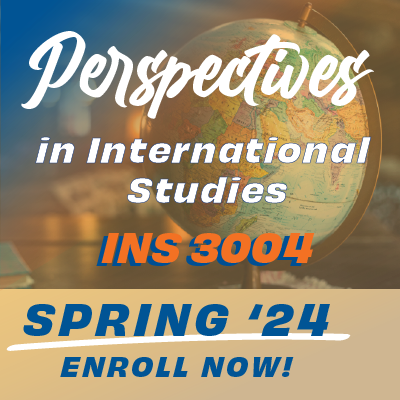Faculty with the Bob Graham Center for Public Service will be offering these courses for the Spring 2024 semester.
IDS 4930: Public Service Management and Leadership (PAD 3003 Intro to Public Admin)
(Section 20698, 14631) This is an upper-level interdisciplinary studies course that will serve as an introduction to managing and leading public service organizations. Knowing how these entities work and how to work within them are two of the most powerful tools that students can have. Students will learn how to diagnose and solve organizational challenges, anticipate opportunities, and influence the actions of individuals and stakeholders. Through lecture, guest speakers, case studies, small-group discussions, and a semester-long group project, the course provides students with introductory tools needed to lead impactful public service entities. The course is cross-listed with the Department of Political Science as PAD 3003 Intro to Public Admin.
INS 3004: Perspectives in International Studies 
This course provides majors in International Studies with a comprehensive introduction to the field. Readings and discussions will cover all regions of the world and engage with contemporary global problems through an interdisciplinary lens that draws from political science, anthropology, economics, sociology, environmental studies, and geography. Topics include globalization, political and economic change, poverty and development, migration and refugees, nationalism, human-environment interactions, human rights, and religion. The course will pinpoint connections between these themes and give students the analytical tools to understand and address the challenges facing human communities at the global and local levels. Our readings and lectures will cover all regions offered to International Studies majors as a specialization.
New! IDS 4930: Environment and Politics in the Middle East (POS 4931/ASH3931)
Section No. 28578: This award-winning course analyzes the Middle East through the lens of political ecology and politicizes the conflicts, conditions, and outcomes that pertain to environmental phenomena in the region. Students learn to question the place, representations, and socio-political functions of “nature,” its conservation, and its degradation in the Middle East. Situating the Middle East in the world of carbon/post-carbon politics, students will debate the potentials and limitations of environmental activism in the region. Students will develop sophisticated understandings of the various relationships of power embedded in environmental disasters, conflicts, and infrastructure projects. This course helps students establish cultural literacy and a critical outlook on multi-species experiences in the Middle East. The course is cross-listed with the Department of Political Science and the Department of History.
IDS 4930/PUP 3323/WST 4930: Women and Politics
Women represent approximately half of the world’s population, yet they are underrepresented in government institutions, such as legislatures, party leadership, and national executives. What explains this phenomenon? In this course, students explore how descriptive representation translates to substantive representation, which electoral laws and systems favor the election of women, and how women behave once in elected office. Students will learn about the changing role of women in the electorate, including women’s voting behavior and preferences. This course will take a comparative approach and investigate women and their relationship to politics cross-nationally, across all the regions of the globe. This course is cross-listed with the Department of Political Science and Women’s Studies.
IDS 4930: Florida Legislative Politics
Asynchronous Online
Observing a session of the Florida legislature is a unique experience. Each session is full of drama, conflicting political priorities, differing visions of the future of the state and last minute strategies to get legislation passed. The Florida legislature represents a large state with an increasingly interesting and dynamic political environment. The state faces many challenges, in a variety of areas, including health, environmental, education, and criminal justice. Throughout this course, students will learn about the important people, processes, and systems that have and continue to shape Florida legislative politics.
AMH 2020: United States Since 1877
American History, 1877-present examines the major social, economic, and political developments that have shaped America from l877 to the present. AMH 2020 is an introductory course designed to expose students of all majors to important themes, interpretations, events, and primary sources in U.S. History. As a part of the course, the instructor will include a special focus on how communities strove forward in the face of unyielding challenges to expand and secure our democracy, civil liberties, and basic human rights.
IDS 4911: Civic/Gulf Scholars Research
The Civic Scholars program offers UF undergraduates an opportunity to engage in a semester of entry-level research to gain better understanding of quantitative and qualitative research approaches. Participants also develop a better understanding of critical issues impacting Florida. Spring 2024 scholars will pursue research on critical issues in civic engagement, public opinion, and public policy impacting Florida’s Gulf communities. Civic Scholars should be prepared to enroll in a 2-credit course instructed by Graham Center faculty, and may potentially present their research in an end-of-semester symposium organized in early April. The course is offered Tuesdays, periods 8-9. Taught by Professor Marianne Vernetson and Dr. Teresa Cornacchione. Registration is departmentally controlled.